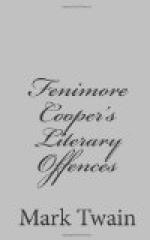“’It
consarns me as all things that touches a fri’nd
consarns a
fri’nd.’”
And this is another of his remarks:
“’If
I was Injin born, now, I might tell of this, or carry
in
the
scalp and boast of the expl’ite afore the whole
tribe; or
if
my inimy had only been a bear’”—and
so on.
We cannot imagine such a thing as a veteran Scotch Commander-in-Chief comporting himself in the field like a windy melodramatic actor, but Cooper could. On one occasion Alice and Cora were being chased by the French through a fog in the neighborhood of their father’s fort:
“‘Point
de quartier aux coquins!’ cried an eager pursuer,
who
seemed
to direct the operations of the enemy.
“‘Stand
firm and be ready, my gallant Goths!’ suddenly
exclaimed
a voice above them; wait to see the enemy; fire low,
and
sweep the glacis.’
“‘Father?
father!’ exclaimed a piercing cry from out the
mist;
it
is I! Alice! thy own Elsie! spare, O! save your
daughters!’
“‘Hold!’ shouted the former speaker, in the awful tones of parental agony, the sound reaching even to the woods, and rolling back in solemn echo. ’’Tis she! God has restored me my children! Throw open the sally-port; to the field, Goths, to the field! pull not a trigger, lest ye kill my lambs! Drive off these dogs of France with your steel!’”
Cooper’s word-sense was singularly dull. When a person has a poor ear for music he will flat and sharp right along without knowing it. He keeps near the tune, but it is not the tune. When a person has a poor ear for words, the result is a literary flatting and sharping; you perceive what he is intending to say, but you also perceive that he doesn’t say it. This is Cooper. He was not a word-musician. His ear was satisfied with the approximate word. I will furnish some circumstantial evidence in support of this charge. My instances are gathered from half a dozen pages of the tale called Deerslayer. He uses “verbal,” for “oral”; “precision,” for “facility”; “phenomena,” for “marvels”; “necessary,” for “predetermined”; “unsophisticated,” for “primitive”; “preparation,” for “expectancy”; “rebuked,” for “subdued”; “dependent on,” for “resulting from”; “fact,” for “condition”; “fact,” for “conjecture”; “precaution,” for “caution”; “explain,” for “determine”; “mortified,” for “disappointed”; “meretricious,” for “factitious”; “materially,” for “considerably”; “decreasing,” for “deepening”; “increasing,” for “disappearing”; “embedded,” for “enclosed”; “treacherous;” for “hostile”; “stood,” for “stooped”; “softened,” for “replaced”; “rejoined,” for “remarked”; “situation,” for “condition”; “different,” for “differing”; “insensible,” for “unsentient”; “brevity,” for “celerity”; “distrusted,” for “suspicious”; “mental imbecility,” for “imbecility”; “eyes,” for “sight”; “counteracting,” for “opposing”; “funeral obsequies,” for “obsequies.”




